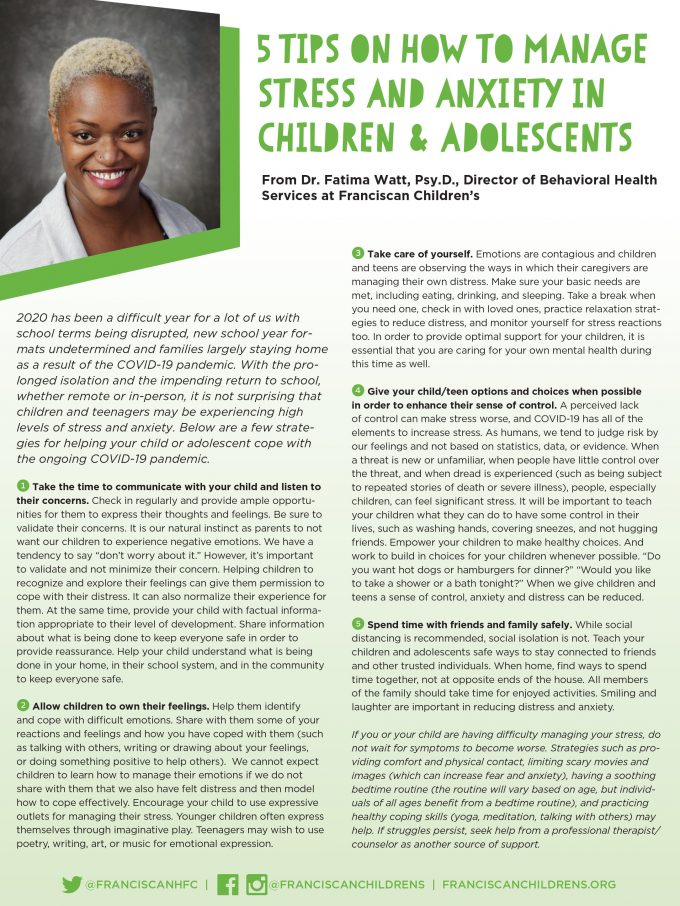World Mental Health Day 2020
World Mental Health Day comes at a time when investing in the mental health of ourselves and our children needs to be a priority. The COVID-19 pandemic has changed all of our lives in drastic ways, forcing us into situations where stress and anxiety are heightened in our relationships and our households.
Managing your mental health, and the mental health of your children and teens, is more important than ever. Below are five tips from Dr. Fatima Watt, Psy.D, Director of Behavioral Health Services at Franciscan Children’s, on how to manage the stress and anxiety young people are facing right now.
If you, your child, or anyone else you know could benefit from talking with a mental health professional, please reach out to our experts by calling 617-779-1314 or emailing us at info@franciscanchildrens.org.
FIVE TIPS ON HOW TO MANAGE STRESS AND ANXIETY IN CHILDREN AND ADOLESCENTS
From Dr. Fatima Watt, Psy.D., Director of Behavioral Health Services at Franciscan Children’s
2020 has been a difficult year for a lot of us with schools having shuttered and families largely staying home as a result of the COVID-19 pandemic. With the prolonged isolation and the impending return to school, whether remote or in-person, it is not surprising that children and teenagers may be experiencing high levels of stress and anxiety. Below are a few strategies for helping your child or adolescent cope with the ongoing COVID-19 pandemic.
1. Take the time to communicate with your child and listen to their concerns.
Check in regularly and provide ample opportunities for them to express their thoughts and feelings. Be sure to validate their concerns. It is our natural instinct as parents to not want our children to experience negative emotions. We have a tendency to say “don’t worry about it.” However, it’s important to validate and not minimize their concern. Helping children to recognize and explore their feelings can give them permission to cope with their distress. It can also normalize their experience for them. At the same time, provide your child with factual information appropriate to their level of development. Share information about what is being done to keep everyone safe in order to provide reassurance. Help your child understand what is being done in your home, in their school system, and in the community to keep everyone safe.
2. Allow children to own their feelings.
Help them identify and cope with difficult emotions. Share with them some of your reactions and feelings and how you have coped with them (such as talking with others, writing or drawing about your feelings, or doing something positive to help others). We cannot expect children to learn how to manage their emotions if we do not share with them that we also have felt distress and then model how to cope effectively. Encourage your child to use expressive outlets for managing their stress. Younger children often express themselves through imaginative play. Teenagers may wish to use poetry, writing, art, or music for emotional expression.
3. Take care of yourself.
Emotions are contagious and children and teens are observing the ways in which their caregivers are managing their own distress. Make sure your basic needs are met, including eating, drinking, and sleeping. Take a break when you need one, check in with loved ones, practice relaxation strategies to reduce distress, and monitor yourself for stress reactions too. In order to provide optimal support for your children, it is essential that you are caring for your own mental health during this time as well.
4. Give your child/teen options and choices when possible in order to enhance their sense of control.
A perceived lack of control can make stress worse, and COVID-19 has all of the elements to increase stress. As humans, we tend to judge risk by our feelings and not based on statistics, data, or evidence. When a threat is new or unfamiliar, when people have little control over the threat, and when dread is experienced (such as being subject to repeated stories of death or severe illness), people, especially children, can feel significant stress. It will be important to teach your children what they can do to have some control in their lives, such as washing hands, covering sneezes, and not hugging friends. Empower your children to make healthy choices. And work to build in choices for your children whenever possible. “Do you want hot dogs or hamburgers for dinner?” “Would you like to take a shower or a bath tonight?” When we give children and teens a sense of control, anxiety and distress can be reduced.
5. Spend time with friends and family safely.
While social distancing is recommended, social isolation is not. Teach your children and adolescents safe ways to stay connected to friends and other trusted individuals. When home, find ways to spend time together, not at opposite ends of the house. All members of the family should take time for enjoyed activities. Smiling and laughter are important in reducing distress and anxiety.
If you or your child are having difficulty managing your stress, do not wait for symptoms to become worse. Strategies such as providing comfort and physical contact, limiting scary movies and images (which can increase fear and anxiety), having a soothing bedtime routine (the routine will vary based on age, but individuals of all ages benefit from a bedtime routine), and practicing healthy coping skills (yoga, meditation, talking with others) may help. If struggles persist, seek help from a professional therapist/counselor as another source of support.
